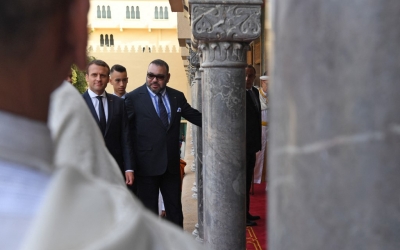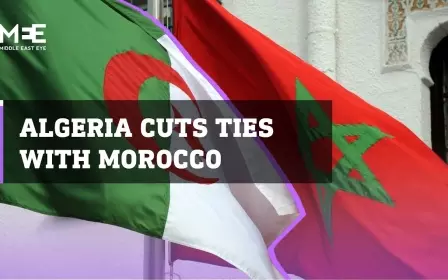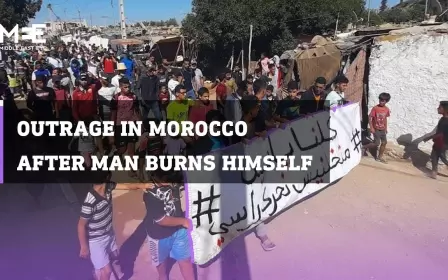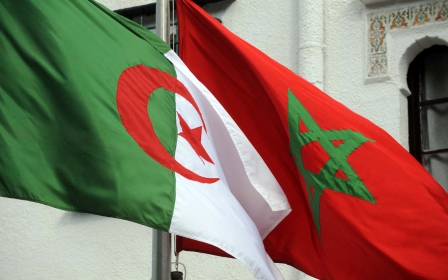Algeria and Morocco: A troubled history
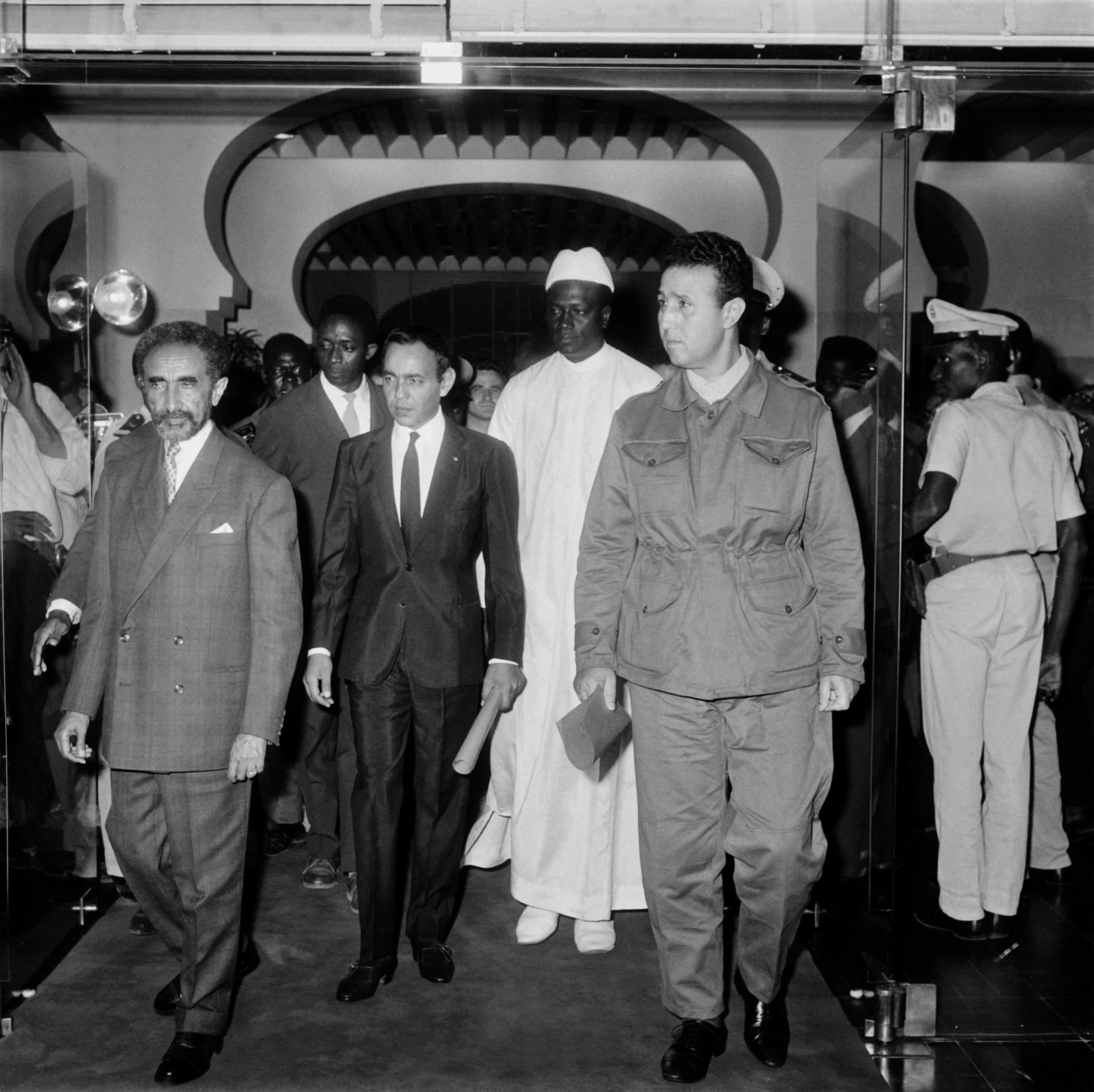
The tumultuous relationship between the neighbouring states of Morocco and Algeria has once again hit rock bottom, with Algiers deciding to break off relations with Rabat.
A number of issues - both new and old - have driven a wedge between the two North African countries, including the longstanding dispute over Western Sahara, Morocco's normalising relationship with Israel and revelations that Morocco may have spied on the phones of Algerian officials.
Algerian Foreign Minister Ramtane Lamamra said Morocco had not "ceased its unfriendly, low and hostile manoeuvres against Algeria for a day since independence", as he broke off relations on Tuesday.
However, the relationship hasn't always been so acrimonious.
Middle East Eye takes a look at the history of North Africa's most turbulent relationship:
Prior to independence
Both Morocco and Algeria were colonies of France before gaining independence in the mid-20th century.
In 1956, Morocco, which was also partly controlled by Spain, negotiated its independence from France, leading to the establishment of a constitutional monarchy, though Spain continued to control Western Sahara until 1976.
Algeria, which had been controlled by France since 1830, eventually gained independence in 1962 after a long and very bloody conflict with the colonial power.
The National Liberation Front (NLF), who fought against the French colonial forces in Algeria, received funding, arms and medicine from Morocco, which also provided safe havens for NLF leaders.
In the fight against European colonialism - and despite the big ideological differences between the Moroccan monarchy and the Arab nationalist NLF - there was cooperation between the two countries.
Territorial disputes
Almost immediately after Algeria managed to achieve independence, the two countries began to quarrel over territory.
1963 saw the beginning of the Sand War over a number of territories near the Western Sahara region, which at this point was still controlled by Spain.
The conflict, which would last for just over three months, would end up having major consequences.
Though Morocco would abandon its claims to Algerian territories in 1972, the fear of Moroccan expansion became a key factor in Algeria's decision to support the independence of Western Sahara, as Algiers felt it would help check Moroccan irredentism.
Western Sahara dispute
The issue that would come to most dominate Algeria-Morocco relations in the 20th and 21st centuries is undoubtedly the question of Western Sahara.
Spain clung onto the territory until 1976. With the dictatorship of Francisco Franco coming to an end, the country signed the Madrid Accords with Morocco and Mauritania, carving the territory up between the two African countries.
This left the native Sahrawi people without statehood or self-governance.
The Madrid Accord was bitterly opposed by Algeria, which viewed it as both a continuation of colonialism and a threat to Algerian influence in North Africa.
Soon after, Algeria broke off relations with Morocco and began supplying pro-Sahrawi independence organisation the Polisario Front with supplies, arms and refuge.
At least 45,000 Moroccans were expelled from Algeria, who would in 1976 begin accepting large numbers of Sahrawi refugees fleeing their homeland.
In 1976, Algeria recognised the Sahrawi Arab Democratic Republic (SADR), which the Polisario Front declared in that year, as the legitimate authority over Western Sahara.
The Western Sahara war would last until 1991, with Algeria providing headquarters to the Polisario Front throughout, effectively preventing any normalisation of relations with Morocco.
Though a ceasefire was established in 1991, this collapsed almost 30 years later in 2020.
Algerian civil war
The Algerian civil war, which sparked off in 1992 following a military coup that overturned an Islamist-won election, ended up drawing in both countries.
The Algerian state accused Morocco of funding the Armed Islamic Group of Algeria (GIA), which launched an armed uprising following the coup.
In 1994, a bomb attack struck a hotel in Marrakech, killing two Spanish tourists. Morocco blamed Algeria for the attack, though there was little evidence supporting this.
The spat eventually led to the closure of the border between the two countries in 1994 - a state of affairs that has persisted to this day.
Recent developments
In 2004, Morocco abolished visa requirements for Algerians, a move that was reciprocated in 2006.
But despite these apparently friendly gestures, relations in the last few years have once again crumbled.
The reignition of fighting with the Polisario Front in 2020 coincided with Morocco normalising relations with Israel - for which, in return, the US agreed to recognise Moroccan sovereignty over Western Sahara.
The reignition of fighting with the Polisario Front in 2020 coincided with Morocco normalising relations with Israel
All these moves have angered Algeria, both because of its support for the Sahrawis and its hostility to Israel.
Revelations in reports on the Pegasus software leaks have further strained ties. According to data shared by Forbidden Stories and Amnesty International with Le Monde, Rabat was “one of the biggest users of the spyware, to the detriment of the Algerian authorities".
In August, wildfires raged across Algeria, claiming dozens of lives. The Algerian government last week blamed arsonists linked to separatists in the Kabylie region for starting the fires.
The government added that the separatists received "support and help from foreign parties, particularly Morocco and the Zionist entity”, referring to Israel.
Earlier in the month, a Moroccan diplomat expressed support for self-determination for the people of Kabylie, who are an Amazigh-speaking people.
This latest airing of grievances appears to have been the last straw.
Middle East Eye propose une couverture et une analyse indépendantes et incomparables du Moyen-Orient, de l’Afrique du Nord et d’autres régions du monde. Pour en savoir plus sur la reprise de ce contenu et les frais qui s’appliquent, veuillez remplir ce formulaire [en anglais]. Pour en savoir plus sur MEE, cliquez ici [en anglais].


